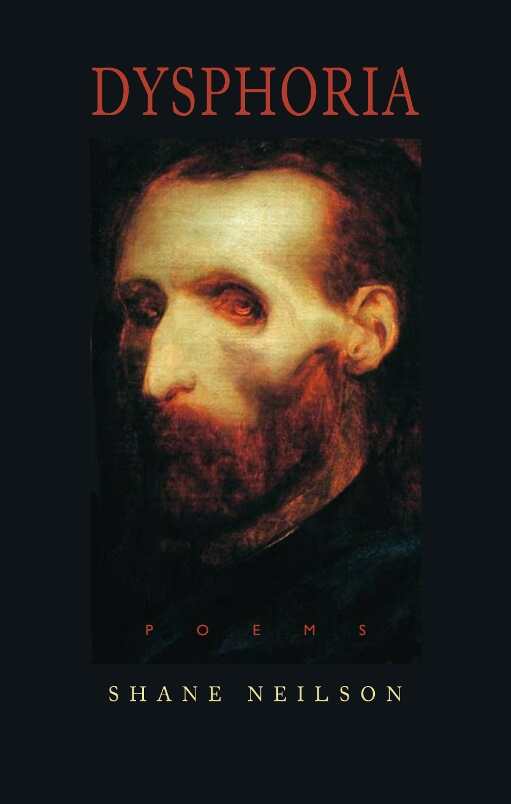Dysphoria
Difficult at times, but immensely rewarding, Dysphoria is alternative medicine for the mind and the soul.
Shane Neilson uses his background as a physician and his interest in old medical writings to inspire his darkly probing poetry collection Dysphoria.
Dysphoria follows Neilson’s collections Complete Physical and On Shaving Off His Face, touching on many of the same themes as those books: the relationship between doctor and patient, the problems of mind and body, and the treatments that often seem to inflict pain as much as alleviate it.
In his medical practice and in these poems, some of which were previously published in literary journals and anthologies, Neilson studies mental illness, pain, and disability as a firsthand witness and as an interpreter. The book is uncomfortable at times, and its title is achingly appropriate: dysphoria is defined by Merriam-Webster as “a state of feeling unwell or unhappy”; Neilson so convincingly illuminates the world of the mentally ill that it’s a relief to put the book down. But it is through his detailed poetic illuminations that these experiences become not just things described, but also deeply felt.
The book is divided into three parts, the first of which earned a spot as a finalist in The Seattle Review‘s 2016 Chapbook Contest. The title and introductory poem, “Dysphoria,” is a sixteen-part, eighteen-page epic that uses lyrical enjambment to propel its nimble wordplay, and entertains as it empathizes—perhaps best exemplified by its narrator selectively quoting Percy Sledge while alluding to mental illness (“When a man loves a woman, he can’t keep his mind”).
Alliteration, repetition, assonance, and consonance are all on display as the poem continues:
Puritanicals burn at the stake while witches watch.
In Hades’s soft middle the middle class yearns. Sky
riots to azure. Pure from purging cures, we can’t lose
what we know. Go back to Genesis—we ate the fruit
from the tree. Didn’t we? The lost are found. New losses
levy fees. Who among us allows us; who are we? Nemeses.
The book’s second section draws inspiration from Dr. Benjamin Rush’s 1812 book Medical Inquiries and Observations Upon Diseases of the Mind, pulling phrases for use as lines or titles, and examining such subjects as bloodletting and patients who imagine themselves to be made of glass. In the long-titled poem “Letters to Dr. Rush from an escaped man, who was so happy in his paroxysms of madness, that when he was well he longed with impatience for their return,” Neilson cuts to the core of madness and identity, and what it costs to change that identity—or to have it changed by others. The third section, “Pain on a One-to-Ten Scale,” features moving meditations on pain, both physical and emotional.
Showcasing a variety of perspectives on these subjects, Neilson is able to find fertile new ground, even in his now-familiar fields of medicine and mental illness. Dysphoria is further enhanced by a relevant and profound selection of drawings for the interior pages, culled from a nineteenth-century French book on mental maladies.
Despite occasional bits of humor, Dysphoria is not a light read, neither in its content nor its delivery; it requires, and deserves, careful attention to parse the many allusions and references, or to appreciate the poetic techniques masterfully utilized by Neilson. Difficult at times, but immensely rewarding, Dysphoria is alternative medicine for the mind and the soul.
Reviewed by
Peter Dabbene
Disclosure: This article is not an endorsement, but a review. The publisher of this book provided free copies of the book and paid a small fee to have their book reviewed by a professional reviewer. Foreword Reviews and Clarion Reviews make no guarantee that the publisher will receive a positive review. Foreword Magazine, Inc. is disclosing this in accordance with the Federal Trade Commission’s 16 CFR, Part 255.

